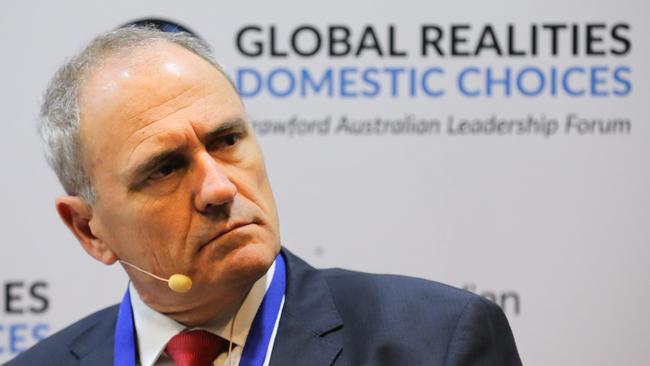Lethal intervention on the demise of political rationality and integrity


In a lethal intervention documenting the demise of rationality and integrity in our politics, former Treasury chief Ken Henry declares corporate tax cuts an obvious “no option” reform, damns the futile debate about the issue and calls for real tax reform.
The essential question Henry puts to the country today is: how much shame, craven self-interest and sabotage of the national interest will our political system tolerate?
In an interview with The Australian and in his speech, Henry says cutting the company tax rate is but “a small part” of a sweeping tax system restructuring that Australia needs. He warns that political failure has led to a “lost decade” on tax reform.
The burden being placed on the personal income tax system was “unsustainable”.
While Henry signs up to the established Treasury orthodox — that much of the corporate tax-cut benefit will flow to employees and higher wages — he shatters the tax myths fondly cherished on both sides of politics.
Henry puts these propositions: the current tax system cannot finance current government spending through the economic cycle; it cannot deliver a balanced budget over the cycle; given these realities the total tax share is too low “as a simple fact”; and the system is too narrowly based on taxes, such as company tax, that are subject to international competition and must be cut over time.
He attacks the magnitude of denial in politics and calls for the business community to get serious “about the social purpose of business”, thereby playing a greater role in public debate.
Henry laments how politics has generated a huge debate about a strictly limited reform, as the nation obsesses about when and how far to cut company taxes. In a sharp warning to politicians he says “countries don’t get to choose their own company tax rate in perpetuity”.
His message is that the nation needs comprehensive tax reform. That means a more broadly based tax model that is simpler, funds world-class education and health systems, meets the needs of the fastest-growing population in the developed world, can manage the congestion crisis in our cities and reduces the weight on personal income tax.
Nearly a decade since his comprehensive and largely non-implemented report into the tax system, Henry says his recommendations are “even more relevant today”. He says the existing system “cannot manage the challenges we identified a decade ago”.
The biggest jolt comes when Henry outlines how today’s tax system would look had his report been implemented a decade ago — a broadbased cashflow tax replacing the GST and payroll taxes; a 25 per cent company tax rate for all companies; a simple and progressive two-rate personal income tax system; land taxes instead of stamp duties and property transfers; a carbon emissions trading scheme, road-user charges replacing fuel excises and vehicle registration taxes; and a resources rent tax replacing royalties.
In short, the renewable energy targets, the Medicare levy, the “invoice-and-credit” GST and a litany of small taxes would have been abolished.
His speech highlights the “significant” increase in the size of government over the past decade — a reference to Labor’s vast new spending projects in office, largely accepted by the Turnbull government. “That will have to be paid for,” Henry says.
“It is also evident that the personal income tax system is being called upon to generate an increasing share of revenue continuing to be propelled by fiscal drag. That is unsustainable.”
On company tax, Henry says there is “good reason” to think a lower rate “will drive a faster rate of investment and labour productivity” leading to higher wages over time.
Henry is tapping into the most sensitive area in economic policy: the fiscal and tax consequences flowing from the legacy of the Rudd-Gillard years and the determination of the Senate post-2013 to decline to engage in deep spending reductions.
He says Australia is caught with an unsustainable tax structure. It is defined by multiple, often conflicting objectives, base erosion, very high compliance costs and complexity with 10 taxes raising 90 per cent of revenue and the remaining 10 per cent funded by more than 100 other taxes.
The nation needs a 10-year plan for tax reform built upon a new narrative as called for by former Reserve Bank board member Heather Ridout, a member of the Henry tax review committee a decade ago.
“Australia will get no progress on tax reform unless the community sees vested interest make way for the national interest,” Henry says.
He has a sharp message for business — it must accept responsibility “for the social and environmental outcomes of our activities.” Unless business can transcend the mere maximisation of profits then it will struggle to win community trust and respect.
Henry wants to see the business sector play a bigger and more influential role in the national debate. But the necessary precondition is establishing its legitimacy in public debate. That means both accepting its wider responsibility to the community and forming a consensus on an ambitious role for government.
His chief concern is that Australia is failing to rise to the contemporary challenges — a growing and ageing population, rising expectations about living standards amid falling education performance, and increasing pressures from globalisation, the environment and technological transformation.





To join the conversation, please log in. Don't have an account? Register
Join the conversation, you are commenting as Logout